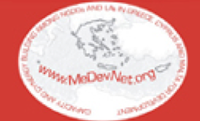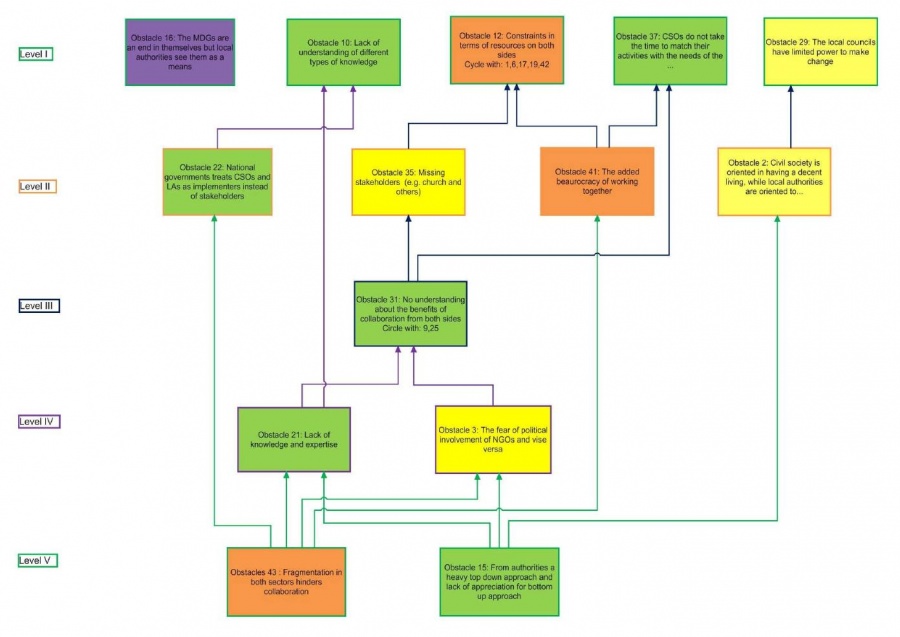SDDP MeDevNet Malta 2011: Difference between revisions
(Created page with " Category:SDDP (MeDevNet) Category:SDDP (Society) Category:SDDP (Local Authorities) Category:SDDP Reports") |
No edit summary |
||
| Line 1: | Line 1: | ||
{{SDD_Report <!-- The name of the template --> | |||
|acronym= MeDevNet Malta Report <!-- Append to variable acronym the content acronym of the sdd report --> | |||
|book_image=MeDevNet_Logo.png <!-- You can replace all the template's variables with the appropriate content--> | |||
|report_title= [[Capacity and Synergy building among NGDOs and LAs in Greece, Cyprus and Malta for development]] <!-- if a variable left empty e.g " report_title =" or not used at all then it will not appear on the template --> | |||
|Triggering_Question= "What obstacles prevent cooperation between Civil Society & Local Authorities in Malta towards achieving Millennium Development Goals (MDGs)?" <br> | |||
|project=[[MeDevNet]] | |||
|author=[[Tatjana Taraszow]]<br> [[Ilke Dagli]] | |||
|editor=[[Yiannis Laouris]] <br> [[Kerstin Wittig]] | |||
|total_duration= | |||
|stats=Participants=19 <br> Number of ideas=41 <br>Number of Clusters=5 <br> Ideas received Votes=21 <br> Ideas on MAP R=21 <br>Spreathink ST=63% | |||
|dates=22-24 March 2011 | |||
|link=http://www.medevnet.org | |||
}} | |||
==Executive Summary== | |||
This co-laboratory is part of a cycle of trainings and other activities organised within the framework of the European project [[Capacity and Synergy building among NGDOs and LAs in Greece, Cyprus and Malta for development]]. | |||
The [[MeDevNet]] project is implemented in the target countries Greece, Cyprus and Malta. The overall objective of this co-laboratory was to find the most influential obstacles that prevent cooperation beetween Local Authorities and NGO’s. The structured dialogue process empowered the consortium team to identify the most influential mechanisms in overcoming these obstacles. The workshop was organized using the structured dialogic design process (SDDP) approach within the context of a rich web-based communication | |||
environment. | |||
<br> | |||
<u>The [[Triggering Question]] (TQ) was </u><br> | |||
'''What obstacles prevent cooperation between Civil Society & Local Authorities in Malta towards achieving Millennium Development Goals (MDGs)?''' <br> | |||
In response to the TQ, 19 participants came up with 41 ideas, which were categorized in 5 clusters. Following the voting process, 21 ideas received one or more votes and were structured to create the influence MAP shown below. <br> | |||
<br> | |||
[[File:MeDevNet_map_Malta.jpg|thumb|center|upright=3.0|alt=MAP for MeDevNet Malta.|Influence tree from the Characteristics SDDP of the MeDevNet Malta laboratory TQ.]] | |||
<br> | |||
According to the participants of this laboratory, appear to be the most influential were: <br> | |||
* Characteristic #15, From authorities a heavy top down approach and lack of appreciation for bottom up approach <br> | |||
* Characteristic #43, Fragmentation in both sectors hinders collaboration | |||
==Sponsor and partners== | |||
The MeDevNet project is funded by the '''European Commission''' under the [[EuropeAid]] program.<br> | |||
The project’s partner organisations are: | |||
*[[European Perspective |Development and Education Centre European Perspective]] | |||
*[[Future Worlds Center]] (Cyprus) | |||
*[[KOPIN (Malta)]] | |||
*[[TEDKNA - Local Union of Municipalities & Town Councils of Attica (Greece)]] | |||
*[[Valletta Local Council (Malta)]] <br> | |||
The associate partners are: | |||
* [[Greek Platform of Non Governmental Development Organizations (Greece)]] | |||
* [[NGO Platform ‘The Development’ (Cyprus)]] | |||
* [[SKOP (Solidarjeta u Koperazzjoni) (Malta)]] | |||
* [[Greek Migrants’ Forum (Greece)]] | |||
* [[Migrants’ Solidarity Movement (Malta)]] | |||
* [[The Association of Palestinian Community in Cyprus (Cyprus)]] | |||
* [[Cameroonian Diaspora in Cyprus (Cyprus)]] | |||
* [[Municipality of Leukara (Cyprus)]] | |||
* [[UCLGA (Panafrican)]] | |||
==External Links== | |||
[[http://www.medevnet.org Official Website]] | |||
==References== | |||
{{Reflist}} | |||
[[Category:SDDP (MeDevNet)]] | [[Category:SDDP (MeDevNet)]] | ||
Revision as of 11:09, 8 August 2012
|
Executive Summary
This co-laboratory is part of a cycle of trainings and other activities organised within the framework of the European project Capacity and Synergy building among NGDOs and LAs in Greece, Cyprus and Malta for development. The MeDevNet project is implemented in the target countries Greece, Cyprus and Malta. The overall objective of this co-laboratory was to find the most influential obstacles that prevent cooperation beetween Local Authorities and NGO’s. The structured dialogue process empowered the consortium team to identify the most influential mechanisms in overcoming these obstacles. The workshop was organized using the structured dialogic design process (SDDP) approach within the context of a rich web-based communication environment.
The Triggering Question (TQ) was
What obstacles prevent cooperation between Civil Society & Local Authorities in Malta towards achieving Millennium Development Goals (MDGs)?
In response to the TQ, 19 participants came up with 41 ideas, which were categorized in 5 clusters. Following the voting process, 21 ideas received one or more votes and were structured to create the influence MAP shown below.
According to the participants of this laboratory, appear to be the most influential were:
- Characteristic #15, From authorities a heavy top down approach and lack of appreciation for bottom up approach
- Characteristic #43, Fragmentation in both sectors hinders collaboration
Sponsor and partners
The MeDevNet project is funded by the European Commission under the EuropeAid program.
The project’s partner organisations are:
- Development and Education Centre European Perspective
- Future Worlds Center (Cyprus)
- KOPIN (Malta)
- TEDKNA - Local Union of Municipalities & Town Councils of Attica (Greece)
- Valletta Local Council (Malta)
The associate partners are:
- Greek Platform of Non Governmental Development Organizations (Greece)
- NGO Platform ‘The Development’ (Cyprus)
- SKOP (Solidarjeta u Koperazzjoni) (Malta)
- Greek Migrants’ Forum (Greece)
- Migrants’ Solidarity Movement (Malta)
- The Association of Palestinian Community in Cyprus (Cyprus)
- Cameroonian Diaspora in Cyprus (Cyprus)
- Municipality of Leukara (Cyprus)
- UCLGA (Panafrican)
External Links

